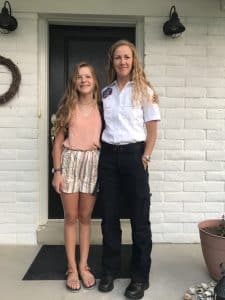
When I was in college, people would start conversations with me by asking, ”What’s your major?” It wasn’t a very creative way to start a conversation but it was effective as an invitation to talk about my interests.
Now that I have long since graduated, people don’t ask me that any more. Most ask me about my job. It’s the grown-up equivalent of “What’s your major?” and it works just as well.
But I have noticed that a significant minority of people–mostly Mormons–don’t ask me about my work. Instead, they ask, “What does your husband do?”
This question doesn’t work as well for me. I can answer the question. I know what my husband does. But then the conversation drags to a halt because I am not terribly interested in my husband’s occupation. He does valuable, meaningful work. There’s nothing wrong with what he does. But I didn’t choose to go into that field myself because it doesn’t interest me personally. And because it doesn’t interest me personally, it’s not the best conversation-starter for me.
Once, at a Mormon wedding, the stranger seated beside me made a valiant effort to start a conversation with me and I tried as hard as I could to engage. First she asked me, “What does your husband do?” She followed that with, “What does your father do?” and then went on to “What does your brother do?”
At this point, the conversation really derailed. I was embarrassed to realize that I didn’t know exactly what my brother did. He traveled a lot. I think he managed some sort of administrative something-or-other and maybe sold some sort of widget. Or service. Or something. I was lost.
Scrambling for a way to get back on track, I blurted out, “I work for a children’s advocacy organization,” and abruptly shifted into more comfortable conversational territory for me.
I was surprised that the stranger reciprocated by telling me all about her own career. Since she had only asked me about the occupations of the men in my life, I had assumed that maybe it hadn’t occurred to her that some women are employed. Not so.
I learned a valuable lesson that day. Now, when people ask me, “What does your husband do?” I respond with a double answer. “My husband is a [very brief answer] and I do [elaborate description].” Now it doesn’t matter that people ask me, “What does your husband do?” because I have found a way to swim out of the awkwardness.
Still, I am curious about why this happens, just as an intellectual question. I’ve asked my husband if people ever ask him, “What does your wife do?” He says they don’t. Ever. Not even after they have covered his own career in detail. Hmm.
Maybe they don’t ask me what I do because they assume that I am a stay-at-home mom? But even if I were, being a stay-at-home mom is doing something, right? Why not ask about it? Or maybe it’s because traditionally, women support their husbands in their husbands’ work, so they assume that I have a lot to say about it? (I do support my husband in his work. I have edited many a paper for him, and yet, I have failed to glean much information because his papers bore me to death.)
What do you think? Why do people ask me, “What does your husband do?” Does this happen to you, too?






30 Responses
I’m actually not asked that question too often. I never ask it of anyone so maybe that’s why? I have no idea.
A few years ago in my ward a sister was telling me a story that I love. A new couple had moved in to the ward and this sister was introducing herself to them. She asked them if they had moved here for his job. The wife smiled sweetly and said they’d moved for her job. This sister said it taught her a big lesson about her assumptions and from now on she was changing that question she often asked.
I think we all grew up with various social niceties questions that we ask to start off a conversation and we often don’t think about how they really sound today to others.
That is a good thought. Perhaps the woman I spoke with at the wedding grew up hearing adults ask women about their husbands’ work, and so even though she grew up to be a working woman herself, she was just used to talking that way as she had learned as a child.
Great post, April! I am aware of this problem, so I always ask new women who move into my university ward, ” Are you connected with the university? What department are you (or your husband) in?” Even though 95% of the time it’s the husband who is in grad school, at least it acknowledges the possibility that they might be grad students themselves. And then I ask what the women do. That 95% male grad student thing has been a bit depressing, by the way. I keep expecting/hoping to get more female LDS grad students in the ward, but they are a rarity.
Great tip! I love to hear better ways to do things. (Also, it makes it more understandable why people may assume it is the man who is working or going to graduate school, if in their experience, that is the answer they always get.)
I’ve learned the hard way not to ask questions like this…
A new friend my son met from soccer informed us that he was homeschooled. Later in the day as I spoke with his parents hoping to get to know them I turned to the mother and said “so I heard you homeschool your boys” she said “no, I’m a physician, my husband homeschools the boys”
Yep. I have learned lots of things by being the person who made the faux pax myself! Life is trial and error.
I generally ask newcomers “What brought you to town?” without being specific about who. Years ago, a sister said, “graduate school” and I responded, “Who is going to school?” When she answered that it was her, I asked what department, and upon hearing then told her about a sister who was faculty in the same college.
Months later, she told me how important that was to her…that she had been dreading that moment for months, and was happily surprised with the matter-of-fact way it was handled, without any judgement for her being the student.
I think generally people are just trying to make conversation. But it definitely can go wrong.
Great tip, Naismith!
We live in the American midwest, and my husband says he gets this question about me all the time. I’m a stay-at-home mom; he usually tells them about my sewing. It’s nice when I go to his office parties and I’m wearing something that I’ve made and his co-workers gush over it. Makes me feel like he is proud of me 🙂
I don’t get this question, but maybe because I’ve lived in the same place a long time and don’t get out much 🙂
But I have lived a in a university ward, and I never ask about school or employment. I do as Naismith does and just ask, what brought you here?
I think and hope this is a thing of the past, but I remember some years ago a new woman in Relief Society introduced herself, visibly shaking with anger, that she was not a “university wife,” that her husband was in graduate school, but she was NOT a “[insert business school name] wife.” I felt badly that someone had asked her if she was a university wife, and I think everyone was put on notice not to do that again after that day, even though I think we’ve only had one woman student at this business school in the past 15 years.
I hate this question. Having recently moved, I was initially asked it all the time. I know some people are generally interested, for some it is a benign conversation starter, and some were trying to place us in a socio economic status, or rather, where do we fit. I started answering that he worked downtown. Because of this experience, I’ve started asking people to tell me about themselves, or what brought you here, or simply how is the transition going.
One more thing. This question is sometimes followed up by “how many kids do you have” or “tell me about your kids.” I don’t object to these questions, but ask me something about myself. Anything.
I grew up and continue to live in an almost entirely LDS suburb of Salt Lake City. This means that almost every woman I know is a stay at home mom. Of the women I’m know that do work, they did stay home when they had children at home.
My mother is a physician and I have worked outside the home most of my adult life so I never realized how ingrained this culture of not recognizing women’s accomplishments was in me until last week. I was out with my husband’s family when I ran into a sister from my mission. She asked me what I was doing these days. My response was to tell her I had just had a baby. I didn’t mention that I have a career or that I am currently applying for grad school. I’m still not sure why I left that out. I think it is after years of avoiding the topic at church because I don’t want to feel like the other.
I’m recently married, and there has been an obvious shift in how people in my new ward talk to me. Before I got married, I was in a singles ward, so of course people asked me questions about myself if they wanted to make small talk. In my new ward, I’ve found that most people who talk to me ask about my husband first and then eventually come around to asking something about me.
It’s even more pronounced with callings. My husband is a high priest at a fairly young age, and I’ve been amazed at how many people approach us at church to ask about his previous callings, while completely ignoring me even though I’m standing right there. My husband once interrupted the flow of conversation to inform the person that I, too, have had callings, but it was pretty awkward since they clearly weren’t interested.
I don’t really love talking about myself, but I have to admit I’ve been kind of put off by this sudden shift. I’m pretty darn used to being a separate person!
#askhermore
“What are your interests?” seems like a good place to start.
I love this. #askhermore
This happens to me, too. One of the first and only people (Latter-day Saint or not) to ask me what I do in first conversations was the female principle in my husband’s former architecture firm. It was at the company party, and I had a two month old babe on my lap. It was so interesting to me to see her assumption versus the assumption of so many others.
Like Caroline, I live near a university, and like Caroline, the majority of the new move ins in my ward come for their husband’s schooling. I’ve taken to asking the wives what brought them, because it leaves it more open. If and when they answer that it was for their husband’s school, I then borrow a question from my husband and ask what keeps them busy. (I ask this to lots of other people, too.) I love it, because it lets people say their work if they want to say their work, or their hobbies/passions, if they want to say their hobbies/passions, and really, everyone spends their time doing something. Even (and perhaps especially) stay at home parents.
Something else that happens to me, as a female in the church, is that I constantly hear my husband asked where he served a mission (not “Did he?), but am not asked where, or if I served, which I did. After he answers, I’ve taken to volunteering, “And I served in California.” The unspoken assumptions really bother me, and with the change in missionary age and increase of sisters, we have got to find a better way to ask those missionary questions.
That is a great way to phrase the question Rachel: “What keeps you busy?”
Great post! I haven’t been asked this question, but I assume that it is because until a few months ago I didn’t have any children and people (correctly) assumed that I was working outside of the home. However, I can’t imagine actually asking a woman that question, without first getting to know her. It completely discounts her as an individual. That said, this post is also a great reminder to be more proactive about getting to know the women in my ward in meaningful ways.
Also, this discussion reminds me of this post at Aspiring Mormon Women: http://aspiringmormonwomen.org/2013/10/21/supporting-others-dreams-by-asking-questions/
In thinking about it, I don’t know if I’ve been asked this question much. I’m not sure I’ve ever asked it of others–I need to be more social.
As a divorced single parent who works full-time, I hate the “what do you do with your kids” question. I don’t know why people ask it, but that seems to be the conversation starter all the time–at work and in other places. Why do people want to know? I’m really baffled. It’s also generally handles after-school childcare, and even comes over to my house most afternoons. I really don’t feel like talking about my ex-husband or my relationship with him with everyone–and even if he wasn’t with the kids, I’d still rather not discuss my childcare arrangements with everyone I meet.
Something got garbled–my ex-husband is usually the one who handles after-school childcare.
We moved about a year and a half ago, and I noticed this kind of thing a LOT. I also noticed that, if we were standing together when the question was asked, it was always directed towards him (“so what do you do?”) and then never subsequently directed towards me. It was always assumed that he is the one who works, whose job brought us here, and that I do not work or do anything of interest to the questioner. I felt so invisible, and I think it hurt extra because it WAS his job that brought us here, and I don’t do any paid work outside the home. But I started making a point of all of the things I do outside of mothering (work with Exponent, volunteering, other interests) whenever I entered that “getting to know you” space with men or women I would meet. I would say things like, “I’m at home with my kids, but I also help run a non-profit oral history project, and I blog with a Mormon women’s blog, and I love to read and garden.” It helped steer the conversation better, I think. I just wish people would have asked me about myself in the first place, rather than having to consciously insert myself into the discussion. Sigh. We have work to do, society.
Over the last few years I have started steering my own ice-breaker questions toward women and what they do. I have actually found that to be just as awkward to begin a conversation, and maybe that also goes back to cultural conditioning. When I ask women what they do (and given, I am almost always talking to SAHMs), they give me an uncomfortable blank look and say, “I just stay home with my kids.” I think I used to do the same thing until I realized that what I do to occupy my time is just as important as what my husband does to occupy his time. I learned that six years ago when we first moved into our ward. My bishop and his counselor came to visit for the first time and spent an hour talking to my husband about his job, while I sat uncomfortably listening because I thought it would be rude to leave a conversation I was being excluded from. I have since learned to express in greater detail the exciting aspects of what I do with my children and outside of my children. I’m still trying to find a way to start that conversation with other women who stay home with their children, without making them feel uncomfortable. I love Rachel’s wording above, “What keeps you busy?” I’m going to try that next time.
We recently moved across the country for me to attend grad school and watching people at church respond when they assume we are here for my husband’s job or school is entertaining and depressing. Watching their consternation when they learn that he quit a high level fancy pants job to move here? That’s priceless.
But where did you move? I am desperately wishing someone just like you would move into my ward…
One thing that I thought long and hard about was this question. I finally hit on, “What keeps you busy.” And when I tried it my first time, the woman at the table next to me got all excited to tell me about her quilting. It was great. I hate quilting, but I think it is beautiful and love that it makes someone excited. AND, turns out she didn’t work outside the home even though her kids had grown up, and so my question didn’t diminish what she did, which worked just fine for their family. 🙂
I found this interesting. I just started law school, so I’ve been meeting a lot of people, and many of those people have asked me what my wife does, as well. So it is a question I’ve seen quite a bit recently.
This is something I have noticed a lot since my husband and I got married 4 years ago (both nearly at 30 years old, him working professionally for 3 years, me working professionally for 7 years and with a master’s degree). The first two years of our marriage we lived in a small SE California Navy town and I also worked. When we became pregnant with our first child we felt like we needed to move to a town we felt comfortable raising our children in. We ended up deciding on Cache Valley (Northern Utah) for my husband’s new computer engineering job, and I wanted to work from home and continue my technical writing and communications consulting, and possibly adjunct at the university or technical college. But I’ve noticed that in California, it wasn’t awkward to talk about what both my husband and I did, and because my husband is shy with new people it was easier for him to naturally discuss what both of us did as well. But now living in Northern Utah, mostly small-town areas, I have rarely been asked about me, just the same “what does your husband do?” question as well. I also have taken up the same response of, “husband does this, and I do this and we have a child who is xyz years old.” And because husband is shy around new people, I’ve also strongly requested that he also do the same. Because really–he’s never asked about what I do. And it’s not that I care about glamorizing our life or our asperations or whatever, I feel it’s important because we are both equal partners in our marriage–and I don’t want to be invisible (and don’t want hubbs to be invisible either). Thank you for your thoughts!
UGH! This is one of my biggest pet peeves. My husband is asked all the time at work “What does your wife do?” He tells them that I am a Clinical Social Worker and work two jobs. At church, no one ever asks him what I do. Instead, it’s “What does your husband do?” when I meet new people at church. Just last Sunday, we had the missionaries over for dinner. One elder turned to my husband and asked him what he did. Then there was no follow up to me with what I do. Maybe because we have a toddler and are Mormon he assumes that I stay home. I will take some of the above advice and when asked what my husband does, will say, “My husband does this and I do this” This phenomenon is one I would REALLY like to see changed.
Great article. “What does your husband do?” can be an inconsiderate and thoughtless question for a women – and although sometimes an innocent one, it can feel as if you are being cut down. It’s a gender biased question which can feel insulting to women who have worked very hard at their educations and careers. It can also be a social pecking order question – in which the questioner is trying to determine economic class or social standing. I think that question comes from a bad place to be honest and gives you the idea that somehow women only get some sort of benefit from their husbands progress instead of their own. The last time someone asked me that I shrugged and said, “You’ll have to ask him.” I just didn’t really have the patience for the social order pecking question anymore. The sad part to me is that I think this comes from the women, and not necessarily the men. I think the men are just curious. The men are less judging. It’s getting to the point where I almost feel paranoid about meeting a new group of women. I’m afraid they won’t even ask me about the four books I’ve written. Instead they’ll go in a circle and talk about the great jobs their husbands have – leaving me feeling as if I’m not good enough for them.